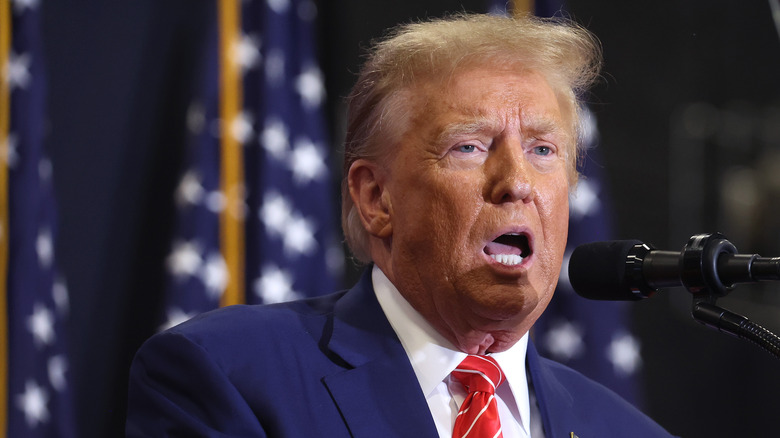The Centuries-Old Act Donald Trump Plans To Use If He Becomes President Again
In the summer of 1798, President John Adams was wrangling with the party of Thomas Jefferson, the Democratic-Republicans, and facing a potential war with France. With the passage of the Alien and Sedition Acts by Adam's fellow Federalists in Congress, he aimed to quash both his problems at once. The Sedition Act allowed Adams to shut down the partisan press of his political enemies, while the Alien Act gave him the power to deport non-citizens hailing from a country with which the United States was at war, according to the National Constitution Center.
More than 200 years later, former President Donald Trump and his advisors are cooking up a plan to revive the Federalist's Alien Act as part of his crackdown on legal and illegal immigration, per The New York Times. Trump has made immigration a centerpiece of his presidential campaigns, beginning with the 2016 election, and continuing with his second run at the White House. But rather than people from countries actually at war with the U.S., which the Supreme Court has found constitutional during wartime, Trump is looking to round up and deport "all known or suspected gang members...the drug dealers, the cartel members" in his own words (via NBC News).
The Alien and Sedition Acts
The wording of "An Act Respecting Alien Enemies," which President John Adams never actually used, stated that during any "declared war" or if there was a "perpetrated, attempted, or threatened" invasion or "predatory incursion" by "any foreign nation or government" the U.S. president could "apprehend" and "remove" any "natives, citizens, denizens, or subjects of the hostile nation or government" 14 years old or older who were not naturalized U.S. citizens (via the National Archives).
The Alien and Sedition Acts, especially the Sedition Act, didn't go over well at the time and have continued to draw fire from historians, per American Experience. Pulitzer-Prize-winning historian Joseph J. Ellis, in an article in American Heritage magazine, called the statutes "infamous" and Adams' backing of them "the biggest blunder" of his presidency. The original intention of the Alien Act was aimed at the many newly arrived French immigrants who supported Jefferson's Democratic-Republican Party. During World War II, President Franklin D. Roosevelt used it to detain Japanese, Germans, and Italians living in the U.S., per NBC News. But Trump's proposed use of the long-dormant act would be a radical take on the 200+ year-old statute.
Trump's interpretation
In a September 2023 election stop in Iowa, Trump promised if re-elected he would "immediately" use the Alien Act to round up and deport alleged gang and drug cartel members "ending the scourge of illegal alien gang violence once and for all," via NBC News. As The New York Times points out, the statute's language clearly links the president's powers to deport non-citizens under the act to those specifically from countries with which the U.S. is at war or where foreign countries are attempting a "predatory incursion." If Trump wins a second term and does invoke the Alien Act, it will likely end up in court.
The passing of the Alien and Sedition Acts backfired on the Federalists, helping to push the political party into eventual oblivion, according to "Criminal Dissent: Prosecutions under the Alien and Sedition Acts of 1798." Time will tell what kind of effect a Trump version of the Alien Act would have on his party if he makes it back into the White House.


